Essay on Front Office and Accommodation in Hospitality Industry
VerifiedAdded on 2023/03/16
|7
|1760
|78
Essay
AI Summary
This essay explores two key aspects of the hospitality industry: front office management and accommodation. The first part focuses on the role of front office managers, emphasizing their importance in guest interaction, financial accounting, and overall hotel operations. It highlights their responsibilities in providing assistance, managing room availability, and ensuring customer satisfaction. The essay also stresses the significance of employee satisfaction for effective service delivery. The second part of the essay examines accommodation, including the legal and regulatory frameworks that govern hotel operations, such as health and safety regulations, workplace provisions, and working time regulations. These regulations are discussed to ensure the well-being of staff and guests. The essay concludes by emphasizing the importance of adherence to these guidelines for a successful hotel business. References to relevant books and journals are included.

TWO MINI ESSAYS
Paraphrase This Document
Need a fresh take? Get an instant paraphrase of this document with our AI Paraphraser
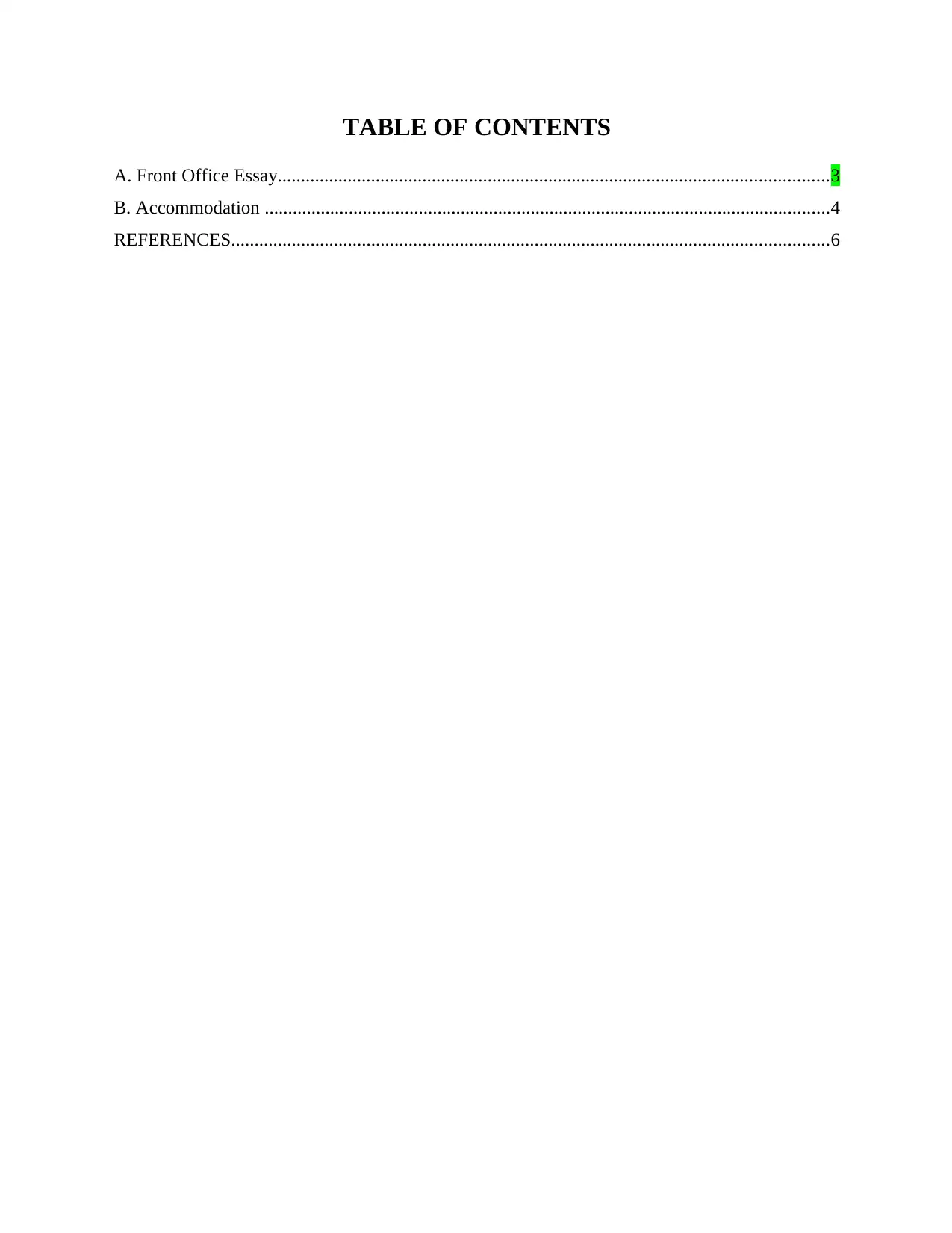
TABLE OF CONTENTS
A. Front Office Essay......................................................................................................................3
B. Accommodation .........................................................................................................................4
REFERENCES................................................................................................................................6
A. Front Office Essay......................................................................................................................3
B. Accommodation .........................................................................................................................4
REFERENCES................................................................................................................................6
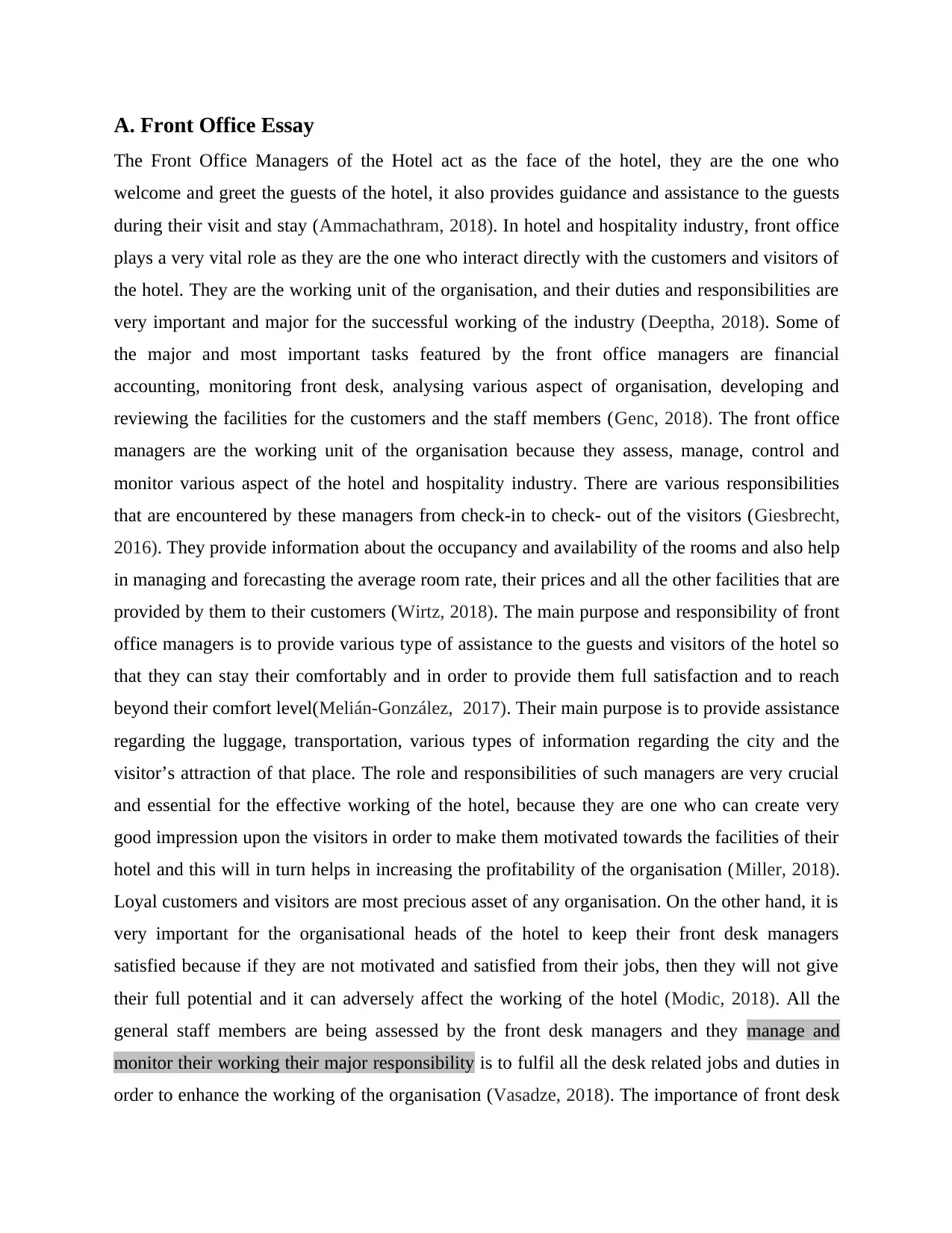
A. Front Office Essay
The Front Office Managers of the Hotel act as the face of the hotel, they are the one who
welcome and greet the guests of the hotel, it also provides guidance and assistance to the guests
during their visit and stay (Ammachathram, 2018). In hotel and hospitality industry, front office
plays a very vital role as they are the one who interact directly with the customers and visitors of
the hotel. They are the working unit of the organisation, and their duties and responsibilities are
very important and major for the successful working of the industry (Deeptha, 2018). Some of
the major and most important tasks featured by the front office managers are financial
accounting, monitoring front desk, analysing various aspect of organisation, developing and
reviewing the facilities for the customers and the staff members (Genc, 2018). The front office
managers are the working unit of the organisation because they assess, manage, control and
monitor various aspect of the hotel and hospitality industry. There are various responsibilities
that are encountered by these managers from check-in to check- out of the visitors (Giesbrecht,
2016). They provide information about the occupancy and availability of the rooms and also help
in managing and forecasting the average room rate, their prices and all the other facilities that are
provided by them to their customers (Wirtz, 2018). The main purpose and responsibility of front
office managers is to provide various type of assistance to the guests and visitors of the hotel so
that they can stay their comfortably and in order to provide them full satisfaction and to reach
beyond their comfort level(Melián-González, 2017). Their main purpose is to provide assistance
regarding the luggage, transportation, various types of information regarding the city and the
visitor’s attraction of that place. The role and responsibilities of such managers are very crucial
and essential for the effective working of the hotel, because they are one who can create very
good impression upon the visitors in order to make them motivated towards the facilities of their
hotel and this will in turn helps in increasing the profitability of the organisation (Miller, 2018).
Loyal customers and visitors are most precious asset of any organisation. On the other hand, it is
very important for the organisational heads of the hotel to keep their front desk managers
satisfied because if they are not motivated and satisfied from their jobs, then they will not give
their full potential and it can adversely affect the working of the hotel (Modic, 2018). All the
general staff members are being assessed by the front desk managers and they manage and
monitor their working their major responsibility is to fulfil all the desk related jobs and duties in
order to enhance the working of the organisation (Vasadze, 2018). The importance of front desk
The Front Office Managers of the Hotel act as the face of the hotel, they are the one who
welcome and greet the guests of the hotel, it also provides guidance and assistance to the guests
during their visit and stay (Ammachathram, 2018). In hotel and hospitality industry, front office
plays a very vital role as they are the one who interact directly with the customers and visitors of
the hotel. They are the working unit of the organisation, and their duties and responsibilities are
very important and major for the successful working of the industry (Deeptha, 2018). Some of
the major and most important tasks featured by the front office managers are financial
accounting, monitoring front desk, analysing various aspect of organisation, developing and
reviewing the facilities for the customers and the staff members (Genc, 2018). The front office
managers are the working unit of the organisation because they assess, manage, control and
monitor various aspect of the hotel and hospitality industry. There are various responsibilities
that are encountered by these managers from check-in to check- out of the visitors (Giesbrecht,
2016). They provide information about the occupancy and availability of the rooms and also help
in managing and forecasting the average room rate, their prices and all the other facilities that are
provided by them to their customers (Wirtz, 2018). The main purpose and responsibility of front
office managers is to provide various type of assistance to the guests and visitors of the hotel so
that they can stay their comfortably and in order to provide them full satisfaction and to reach
beyond their comfort level(Melián-González, 2017). Their main purpose is to provide assistance
regarding the luggage, transportation, various types of information regarding the city and the
visitor’s attraction of that place. The role and responsibilities of such managers are very crucial
and essential for the effective working of the hotel, because they are one who can create very
good impression upon the visitors in order to make them motivated towards the facilities of their
hotel and this will in turn helps in increasing the profitability of the organisation (Miller, 2018).
Loyal customers and visitors are most precious asset of any organisation. On the other hand, it is
very important for the organisational heads of the hotel to keep their front desk managers
satisfied because if they are not motivated and satisfied from their jobs, then they will not give
their full potential and it can adversely affect the working of the hotel (Modic, 2018). All the
general staff members are being assessed by the front desk managers and they manage and
monitor their working their major responsibility is to fulfil all the desk related jobs and duties in
order to enhance the working of the organisation (Vasadze, 2018). The importance of front desk
⊘ This is a preview!⊘
Do you want full access?
Subscribe today to unlock all pages.

Trusted by 1+ million students worldwide
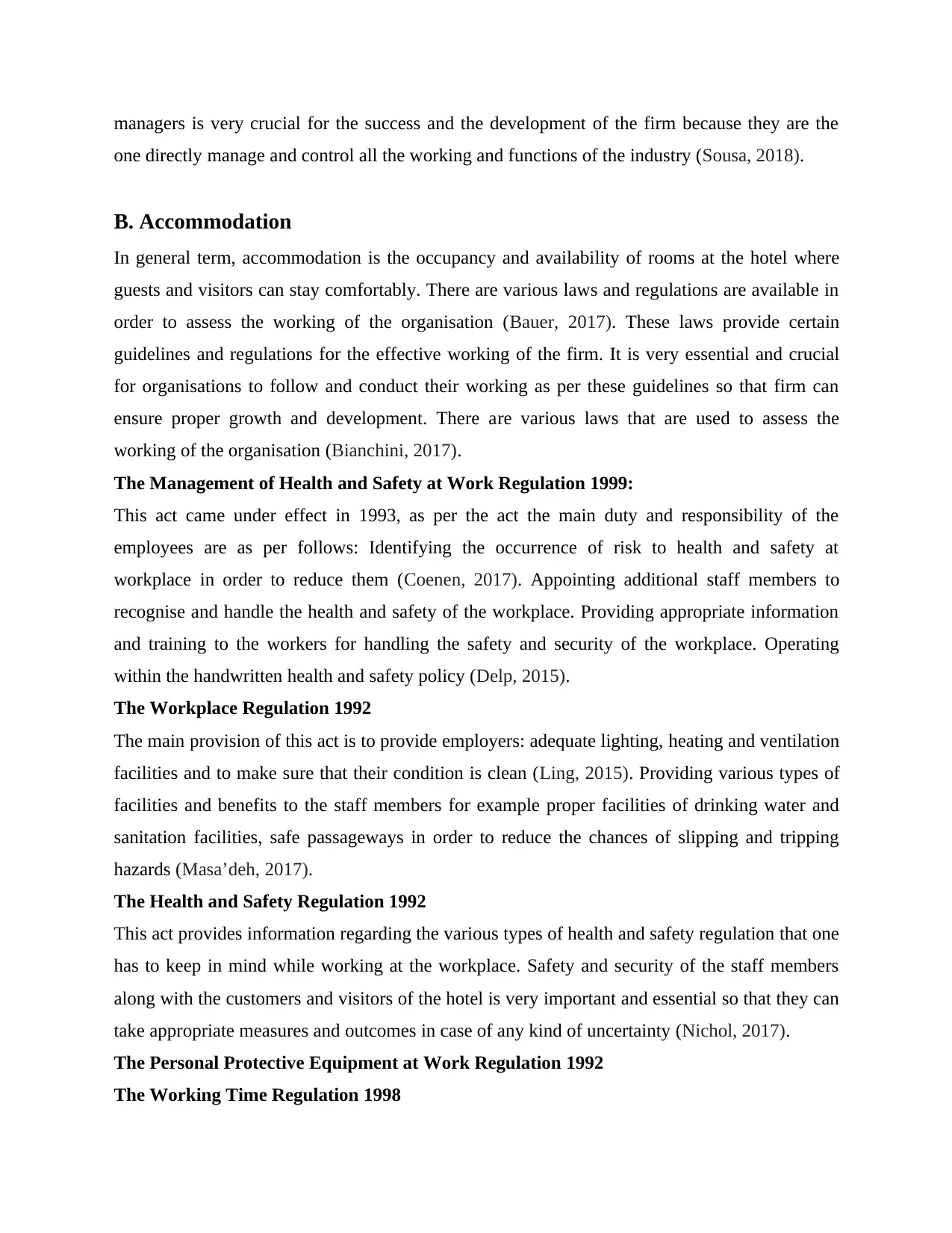
managers is very crucial for the success and the development of the firm because they are the
one directly manage and control all the working and functions of the industry (Sousa, 2018).
B. Accommodation
In general term, accommodation is the occupancy and availability of rooms at the hotel where
guests and visitors can stay comfortably. There are various laws and regulations are available in
order to assess the working of the organisation (Bauer, 2017). These laws provide certain
guidelines and regulations for the effective working of the firm. It is very essential and crucial
for organisations to follow and conduct their working as per these guidelines so that firm can
ensure proper growth and development. There are various laws that are used to assess the
working of the organisation (Bianchini, 2017).
The Management of Health and Safety at Work Regulation 1999:
This act came under effect in 1993, as per the act the main duty and responsibility of the
employees are as per follows: Identifying the occurrence of risk to health and safety at
workplace in order to reduce them (Coenen, 2017). Appointing additional staff members to
recognise and handle the health and safety of the workplace. Providing appropriate information
and training to the workers for handling the safety and security of the workplace. Operating
within the handwritten health and safety policy (Delp, 2015).
The Workplace Regulation 1992
The main provision of this act is to provide employers: adequate lighting, heating and ventilation
facilities and to make sure that their condition is clean (Ling, 2015). Providing various types of
facilities and benefits to the staff members for example proper facilities of drinking water and
sanitation facilities, safe passageways in order to reduce the chances of slipping and tripping
hazards (Masa’deh, 2017).
The Health and Safety Regulation 1992
This act provides information regarding the various types of health and safety regulation that one
has to keep in mind while working at the workplace. Safety and security of the staff members
along with the customers and visitors of the hotel is very important and essential so that they can
take appropriate measures and outcomes in case of any kind of uncertainty (Nichol, 2017).
The Personal Protective Equipment at Work Regulation 1992
The Working Time Regulation 1998
one directly manage and control all the working and functions of the industry (Sousa, 2018).
B. Accommodation
In general term, accommodation is the occupancy and availability of rooms at the hotel where
guests and visitors can stay comfortably. There are various laws and regulations are available in
order to assess the working of the organisation (Bauer, 2017). These laws provide certain
guidelines and regulations for the effective working of the firm. It is very essential and crucial
for organisations to follow and conduct their working as per these guidelines so that firm can
ensure proper growth and development. There are various laws that are used to assess the
working of the organisation (Bianchini, 2017).
The Management of Health and Safety at Work Regulation 1999:
This act came under effect in 1993, as per the act the main duty and responsibility of the
employees are as per follows: Identifying the occurrence of risk to health and safety at
workplace in order to reduce them (Coenen, 2017). Appointing additional staff members to
recognise and handle the health and safety of the workplace. Providing appropriate information
and training to the workers for handling the safety and security of the workplace. Operating
within the handwritten health and safety policy (Delp, 2015).
The Workplace Regulation 1992
The main provision of this act is to provide employers: adequate lighting, heating and ventilation
facilities and to make sure that their condition is clean (Ling, 2015). Providing various types of
facilities and benefits to the staff members for example proper facilities of drinking water and
sanitation facilities, safe passageways in order to reduce the chances of slipping and tripping
hazards (Masa’deh, 2017).
The Health and Safety Regulation 1992
This act provides information regarding the various types of health and safety regulation that one
has to keep in mind while working at the workplace. Safety and security of the staff members
along with the customers and visitors of the hotel is very important and essential so that they can
take appropriate measures and outcomes in case of any kind of uncertainty (Nichol, 2017).
The Personal Protective Equipment at Work Regulation 1992
The Working Time Regulation 1998
Paraphrase This Document
Need a fresh take? Get an instant paraphrase of this document with our AI Paraphraser
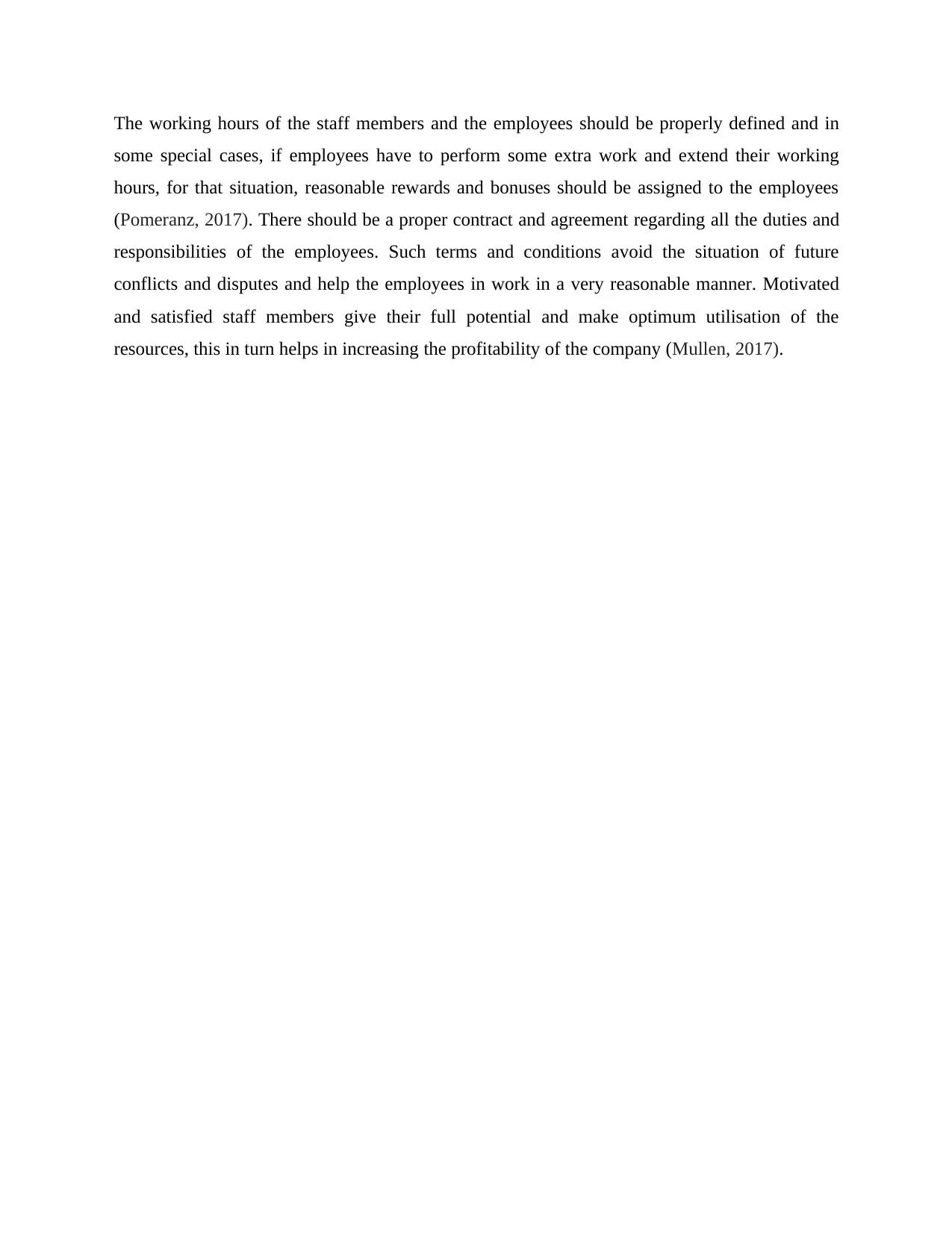
The working hours of the staff members and the employees should be properly defined and in
some special cases, if employees have to perform some extra work and extend their working
hours, for that situation, reasonable rewards and bonuses should be assigned to the employees
(Pomeranz, 2017). There should be a proper contract and agreement regarding all the duties and
responsibilities of the employees. Such terms and conditions avoid the situation of future
conflicts and disputes and help the employees in work in a very reasonable manner. Motivated
and satisfied staff members give their full potential and make optimum utilisation of the
resources, this in turn helps in increasing the profitability of the company (Mullen, 2017).
some special cases, if employees have to perform some extra work and extend their working
hours, for that situation, reasonable rewards and bonuses should be assigned to the employees
(Pomeranz, 2017). There should be a proper contract and agreement regarding all the duties and
responsibilities of the employees. Such terms and conditions avoid the situation of future
conflicts and disputes and help the employees in work in a very reasonable manner. Motivated
and satisfied staff members give their full potential and make optimum utilisation of the
resources, this in turn helps in increasing the profitability of the company (Mullen, 2017).
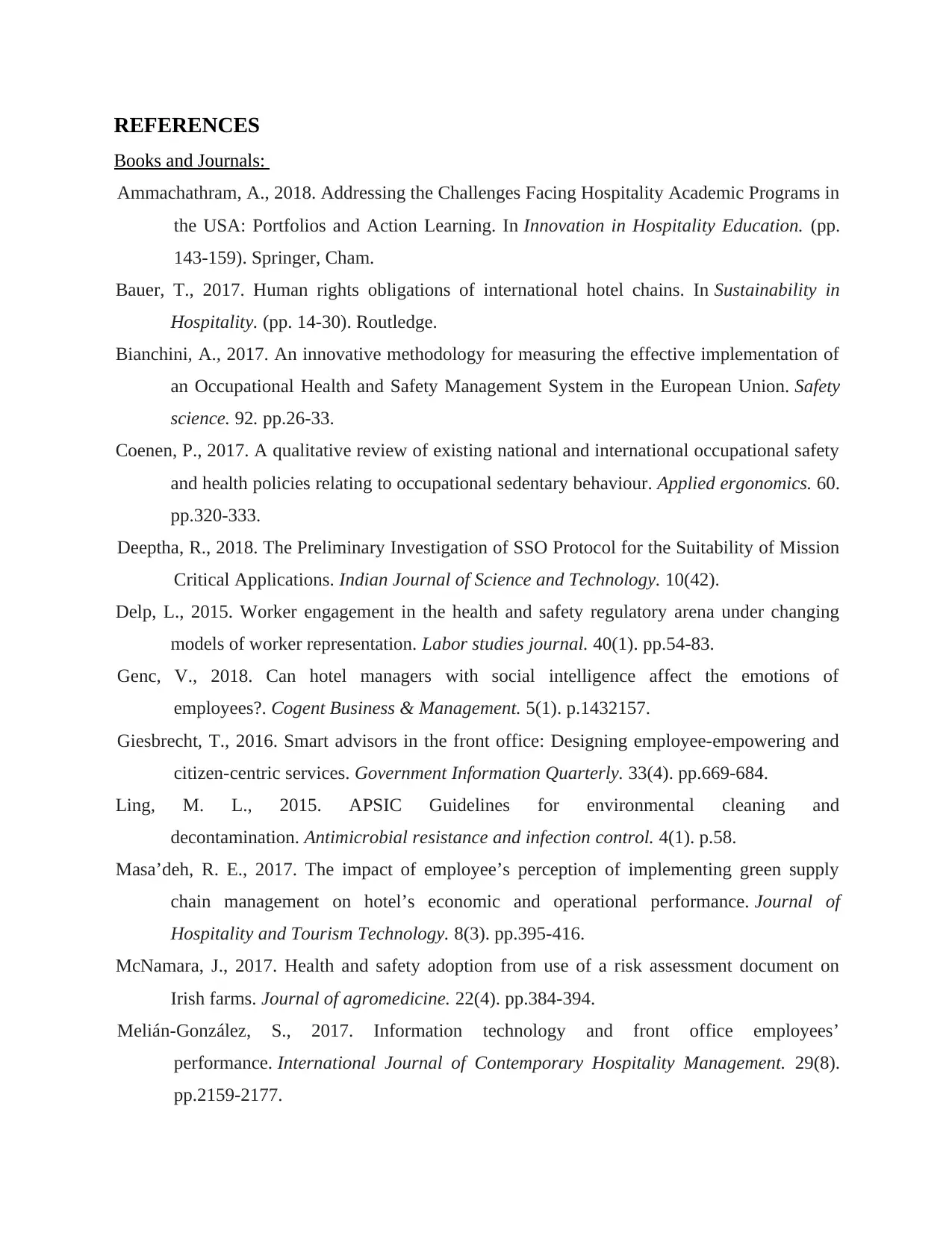
REFERENCES
Books and Journals:
Ammachathram, A., 2018. Addressing the Challenges Facing Hospitality Academic Programs in
the USA: Portfolios and Action Learning. In Innovation in Hospitality Education. (pp.
143-159). Springer, Cham.
Bauer, T., 2017. Human rights obligations of international hotel chains. In Sustainability in
Hospitality. (pp. 14-30). Routledge.
Bianchini, A., 2017. An innovative methodology for measuring the effective implementation of
an Occupational Health and Safety Management System in the European Union. Safety
science. 92. pp.26-33.
Coenen, P., 2017. A qualitative review of existing national and international occupational safety
and health policies relating to occupational sedentary behaviour. Applied ergonomics. 60.
pp.320-333.
Deeptha, R., 2018. The Preliminary Investigation of SSO Protocol for the Suitability of Mission
Critical Applications. Indian Journal of Science and Technology. 10(42).
Delp, L., 2015. Worker engagement in the health and safety regulatory arena under changing
models of worker representation. Labor studies journal. 40(1). pp.54-83.
Genc, V., 2018. Can hotel managers with social intelligence affect the emotions of
employees?. Cogent Business & Management. 5(1). p.1432157.
Giesbrecht, T., 2016. Smart advisors in the front office: Designing employee-empowering and
citizen-centric services. Government Information Quarterly. 33(4). pp.669-684.
Ling, M. L., 2015. APSIC Guidelines for environmental cleaning and
decontamination. Antimicrobial resistance and infection control. 4(1). p.58.
Masa’deh, R. E., 2017. The impact of employee’s perception of implementing green supply
chain management on hotel’s economic and operational performance. Journal of
Hospitality and Tourism Technology. 8(3). pp.395-416.
McNamara, J., 2017. Health and safety adoption from use of a risk assessment document on
Irish farms. Journal of agromedicine. 22(4). pp.384-394.
Melián-González, S., 2017. Information technology and front office employees’
performance. International Journal of Contemporary Hospitality Management. 29(8).
pp.2159-2177.
Books and Journals:
Ammachathram, A., 2018. Addressing the Challenges Facing Hospitality Academic Programs in
the USA: Portfolios and Action Learning. In Innovation in Hospitality Education. (pp.
143-159). Springer, Cham.
Bauer, T., 2017. Human rights obligations of international hotel chains. In Sustainability in
Hospitality. (pp. 14-30). Routledge.
Bianchini, A., 2017. An innovative methodology for measuring the effective implementation of
an Occupational Health and Safety Management System in the European Union. Safety
science. 92. pp.26-33.
Coenen, P., 2017. A qualitative review of existing national and international occupational safety
and health policies relating to occupational sedentary behaviour. Applied ergonomics. 60.
pp.320-333.
Deeptha, R., 2018. The Preliminary Investigation of SSO Protocol for the Suitability of Mission
Critical Applications. Indian Journal of Science and Technology. 10(42).
Delp, L., 2015. Worker engagement in the health and safety regulatory arena under changing
models of worker representation. Labor studies journal. 40(1). pp.54-83.
Genc, V., 2018. Can hotel managers with social intelligence affect the emotions of
employees?. Cogent Business & Management. 5(1). p.1432157.
Giesbrecht, T., 2016. Smart advisors in the front office: Designing employee-empowering and
citizen-centric services. Government Information Quarterly. 33(4). pp.669-684.
Ling, M. L., 2015. APSIC Guidelines for environmental cleaning and
decontamination. Antimicrobial resistance and infection control. 4(1). p.58.
Masa’deh, R. E., 2017. The impact of employee’s perception of implementing green supply
chain management on hotel’s economic and operational performance. Journal of
Hospitality and Tourism Technology. 8(3). pp.395-416.
McNamara, J., 2017. Health and safety adoption from use of a risk assessment document on
Irish farms. Journal of agromedicine. 22(4). pp.384-394.
Melián-González, S., 2017. Information technology and front office employees’
performance. International Journal of Contemporary Hospitality Management. 29(8).
pp.2159-2177.
⊘ This is a preview!⊘
Do you want full access?
Subscribe today to unlock all pages.

Trusted by 1+ million students worldwide
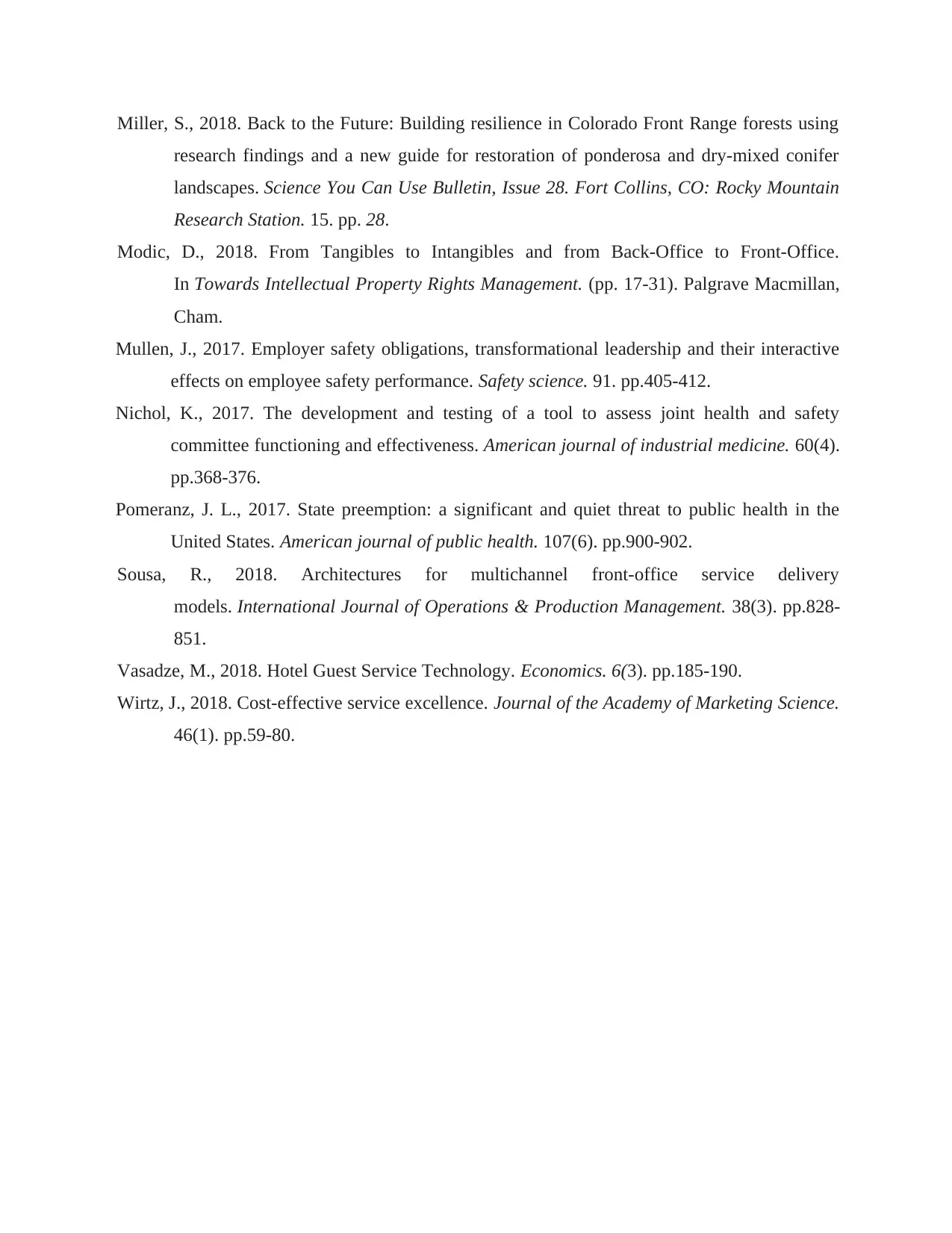
Miller, S., 2018. Back to the Future: Building resilience in Colorado Front Range forests using
research findings and a new guide for restoration of ponderosa and dry-mixed conifer
landscapes. Science You Can Use Bulletin, Issue 28. Fort Collins, CO: Rocky Mountain
Research Station. 15. pp. 28.
Modic, D., 2018. From Tangibles to Intangibles and from Back-Office to Front-Office.
In Towards Intellectual Property Rights Management. (pp. 17-31). Palgrave Macmillan,
Cham.
Mullen, J., 2017. Employer safety obligations, transformational leadership and their interactive
effects on employee safety performance. Safety science. 91. pp.405-412.
Nichol, K., 2017. The development and testing of a tool to assess joint health and safety
committee functioning and effectiveness. American journal of industrial medicine. 60(4).
pp.368-376.
Pomeranz, J. L., 2017. State preemption: a significant and quiet threat to public health in the
United States. American journal of public health. 107(6). pp.900-902.
Sousa, R., 2018. Architectures for multichannel front-office service delivery
models. International Journal of Operations & Production Management. 38(3). pp.828-
851.
Vasadze, M., 2018. Hotel Guest Service Technology. Economics. 6(3). pp.185-190.
Wirtz, J., 2018. Cost-effective service excellence. Journal of the Academy of Marketing Science.
46(1). pp.59-80.
research findings and a new guide for restoration of ponderosa and dry-mixed conifer
landscapes. Science You Can Use Bulletin, Issue 28. Fort Collins, CO: Rocky Mountain
Research Station. 15. pp. 28.
Modic, D., 2018. From Tangibles to Intangibles and from Back-Office to Front-Office.
In Towards Intellectual Property Rights Management. (pp. 17-31). Palgrave Macmillan,
Cham.
Mullen, J., 2017. Employer safety obligations, transformational leadership and their interactive
effects on employee safety performance. Safety science. 91. pp.405-412.
Nichol, K., 2017. The development and testing of a tool to assess joint health and safety
committee functioning and effectiveness. American journal of industrial medicine. 60(4).
pp.368-376.
Pomeranz, J. L., 2017. State preemption: a significant and quiet threat to public health in the
United States. American journal of public health. 107(6). pp.900-902.
Sousa, R., 2018. Architectures for multichannel front-office service delivery
models. International Journal of Operations & Production Management. 38(3). pp.828-
851.
Vasadze, M., 2018. Hotel Guest Service Technology. Economics. 6(3). pp.185-190.
Wirtz, J., 2018. Cost-effective service excellence. Journal of the Academy of Marketing Science.
46(1). pp.59-80.
1 out of 7
Related Documents
Your All-in-One AI-Powered Toolkit for Academic Success.
+13062052269
info@desklib.com
Available 24*7 on WhatsApp / Email
![[object Object]](/_next/static/media/star-bottom.7253800d.svg)
Unlock your academic potential
Copyright © 2020–2026 A2Z Services. All Rights Reserved. Developed and managed by ZUCOL.





